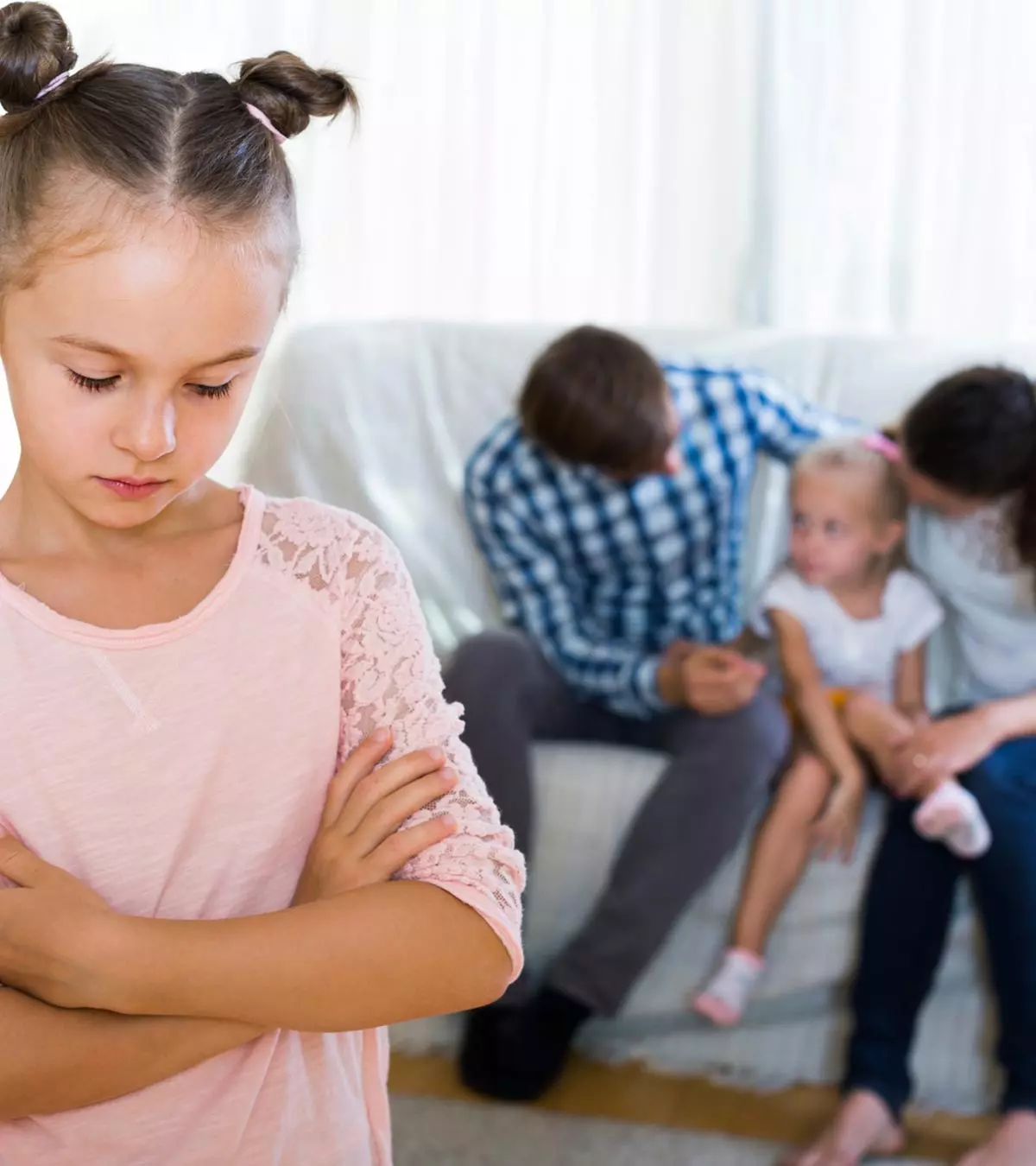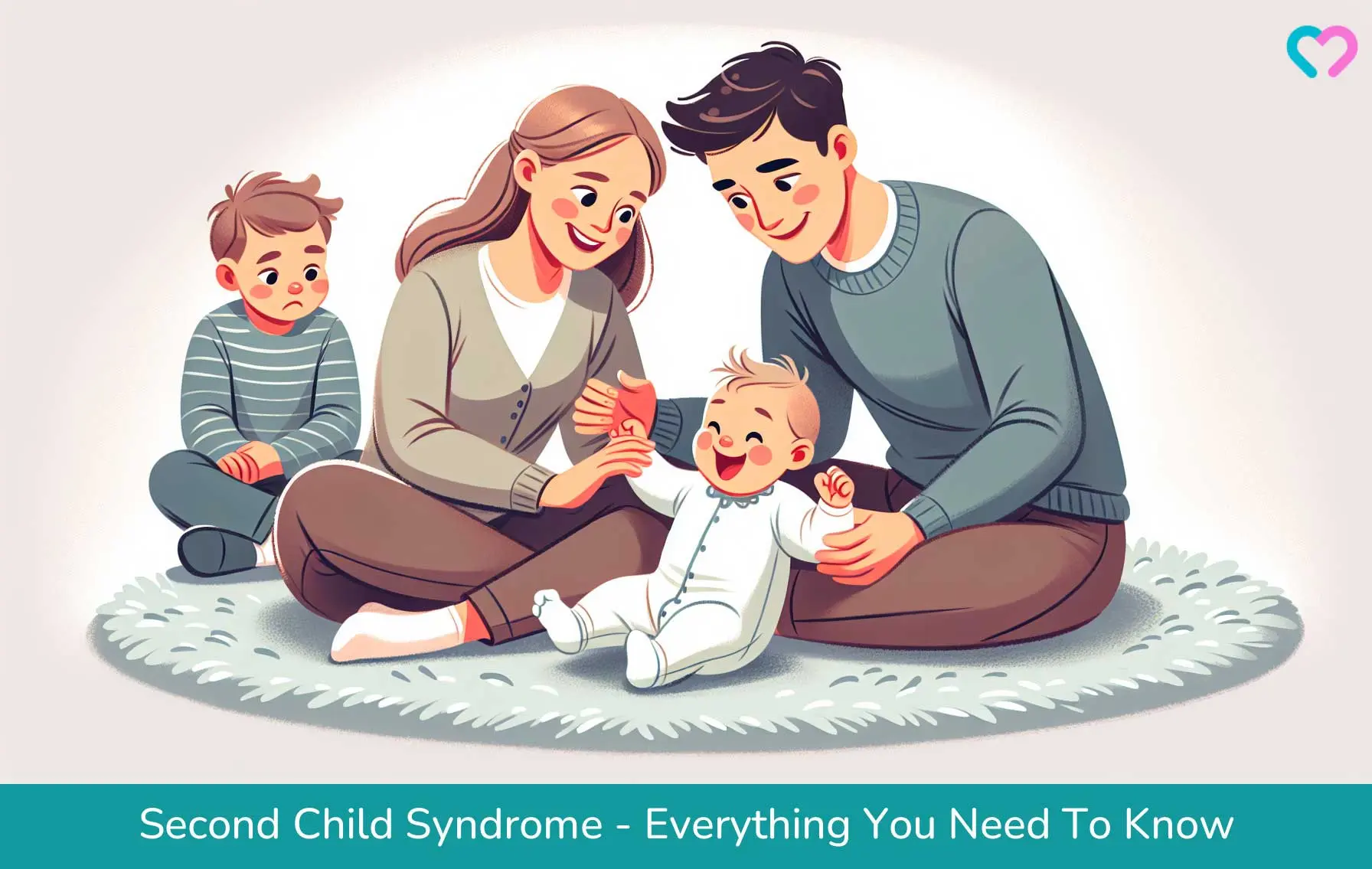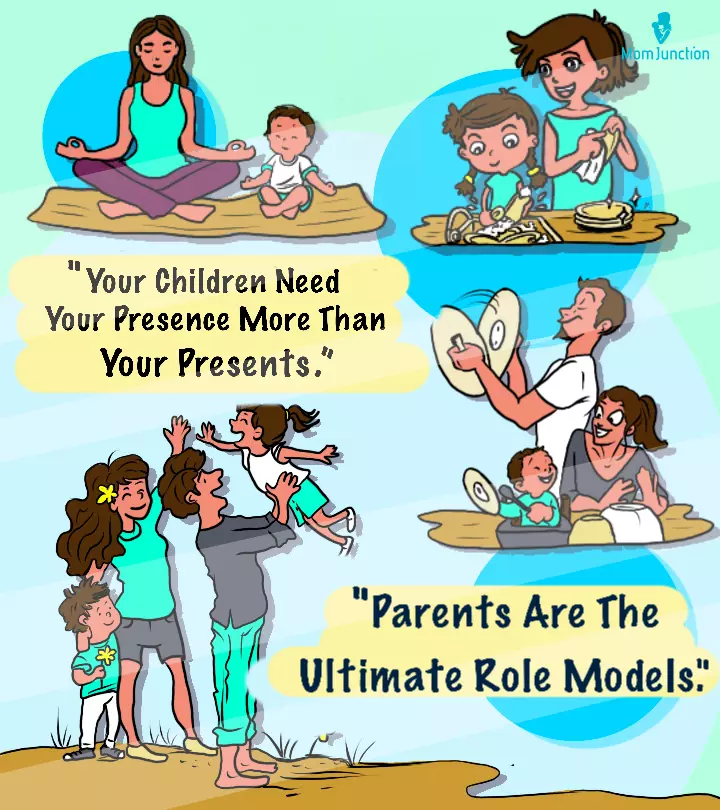
For years, there has been a widespread assumption that middle children do not receive the same level of care as the family’s eldest or youngest children. This phenomenon is known as second child syndrome. While this may not be the case in every home, you should take precautions and be careful to prevent it in your home. Understanding second child syndrome is important for parents to support their children’s emotional growth. This syndrome doesn’t just affect the middle child. The whole family can be affected, creating challenges that need to be handled early on. Read this post to learn about the second or middle child syndrome, its indications, and how to help your child overcome it.
Key Pointers
- A second or middle child syndrome occurs when older or younger siblings have a negative impact on the second or middle sibling.
- The sibling suffering from this syndrome may show signs such as a lack of focus, jealousy, and low self-esteem.
- Some characteristics of Second-child syndrome are the need for constant attention, arguments with siblings, rage, and irritability.
- To prevent a sibling from developing second-child syndrome, it is important to give each sibling equal attention, spend time with them, and use effective communication.
What Is Second Child Syndrome?

A second or middle child syndrome describes a situation in which the second (in case there are only two siblings) or the middle child (in case there are three siblings) is adversely affected by the presence of siblings (1).
This situation could arise when parents pamper the youngest child and give all the responsibilities to the eldest one, while the middle child gets less attention and less responsibility.
In The Birth Order Book, psychologist Kevin Leman argues that when children are caught between two siblings, or at a position where they feel ignored, is when they suffer. They may not give words to their experience but rather communicate their distress with their behavior.
According to the American National Family Life Survey’s survey, 38% of individuals who are the youngest in their family believed they were the favorite. In contrast, only 27% of the eldest made a similar claim. Meanwhile, middle children were the least likely to think they were the favorite child. The survey also shows that only 17% of women who were middle children reported being the family favorite.

Percentage of American who believe they were or were not their parents favorite child
Source: Don’t Play Favorites: New Findings on Parent-Child Relationships in America; Institute for Family StudiesSource: Don’t Play Favorites: New Findings on Parent-Child Relationships in America; Institute for Family Studies
Do All Kids Suffer From Middle Child Syndrome?
Not all middle children develop this syndrome. However, if there is an extreme amount of favoritism and partiality from parents towards one child, then this becomes an issue. There is less evidence of this syndrome in homes where parents pay attention and listen to the needs of all their children, each of whom could have a different personality and needs.
Signs And Symptoms Of Middle Child Syndrome
Your middle or second child could be showing these signs. Look for them and understand why your child may be struggling.
1. Low Self-Esteem And Jealousy

Your second or middle child could develop low self-esteem if he is compared to the elder one. If he is more challenging among your children, you might unknowingly tell your second child to learn from his elder sibling. This comparison can cause jealousy in children, making it hard to reach them.
Try not to compare children excessively. The result may be that the siblings develop both dislike of one another and also lower self-esteem and morale. which can become a barrier of fundamental child development (2).
2. Directionless
Middle children may lose direction if attention is focused on older and younger siblings. They are confused as their parents are more focussed on the elder child. This lack of focus leaves them aimless and contributes towards lack of social skills.
3. They Feel That Nothing Is Expected Of Them
If they do not hear words of appreciation or enjoy some time alone with parents, they begin feeling that their family expects nothing out of them. They feel that they are not good at doing anything, and do not expect people to give them any responsibilities.
Characteristics Of Second Child Syndrome
In his book Birth Order and You, Donald W. Richardson, clinical director at the North Shore Counseling Center, claims that middle children may be confused about their identity, and therefore get caught up between trying to be grown-ups like older siblings and helpless like younger siblings.
This comes from watching their siblings at both ends and wondering who to be like. Your first responsibility as a parent is to understand each child’s unique way of being in the world. For example, one child may be an extrovert who expresses himself well, introvert, while another who shies away from social interaction. Listening carefully will help you know how to approach each individual child.
1. Yearns For Your Affection
Your second child may not respond to your love and affection in the same way as your first one does. If you feel your younger child does not love you or want your attention, think again. He needs as much love as you can give him. He is probably trying to show you that he is not happy with the amount of your love and wants more from you. Spending special time with each child, even if only for 10 minutes a day, can help.
A study with 230 firstborn children and their parents found that children’s attachment to both parents changed after the birth of a sibling. The results showed different attachment patterns, with children in families where both parents had secure attachments experiencing fewer behavior problems. The study emphasizes the importance of parenting and family dynamics in children’s emotional adjustment after a sibling is born (3).
2. Tries To Grab Your Attention
Middle children may seek your attention by asking too many questions or seeking help in everything (4).
They may refuse to do things by themselves and rely heavily on parents or other siblings. They could be mischievous and do things that would draw your attention.
3. Hates Comparisons
When you compare your children, your second child may take offense and do the exact opposite of what you want him to do. Avoid comparison among siblings.
Your second child is at a higher risk of developing emotional issues, especially if he feels unloved or neglected. Not giving enough attention to his needs, developments, and achievements will also make him feel unmotivated. Make sure you cheer for your second or middle one as you do for the others. Help them to realize that they are special for you like your other children.
4. Introvert Or Extrovert
Low self esteem may develop in part due to lack of sufficient attention from parents. On one end of a spectrum kids with low self esteem may shy away from people and avoid socializing. Low self esteem may lead to expressions of anger and irritability. Low self-esteem in children is associated with social withdrawal. According to a study, social withdrawal in childhood often stems from internal factors such as anxiety and negative self-esteem (5).
5. Sibling Rivalry
Rivalry among siblings is a normal typical experience that may be exacerbated if parents do not focus on the individual needs of children of different birth order and temperament. Persistent negative or sour feelings may develop between the siblings. Negative feelings may overshadow the underlying positive feelings of love (2).
Possible Triggers Of Middle Child Syndrome
Your second baby could note the difference in your attitude early in his life. This is likely to affect his self-esteem and also create sibling rivalry. This might lead to second child syndrome in your child. While the main reason could be the lack of attention due to family dynamics, there are some other causes which could affect middle or second children.
1. Identity Crisis
If your child senses that your attention is given preferentially to their siblings it could have an impact on the developmental process of identity formation (6). As the child suffering from the syndrome believes that the attention is either given to one sibling or shared among the others, except him, he tends to have an identity crisis.
They may have difficulty understanding why he is not receiving the same attention or love. He looks for places to fit in and struggles to understand the situation. Often a child whose temperament calls for more support may perceive that they are receiving less attention when the truth is that they need more attention than their siblings. Or in the reverse situation a child may receive less attention when a sibling has significant health issues.
2. Parental Support

Parents naturally give different amounts of attention to their children for a wide variety of reasons. Infants are more helpless and require more support. Some children have different academic abilities and some may need more help than others (7).
Parents should be mindful of their parenting method while responding to the different needs of children. It may impact upon the amount of attention they have to offer at any particular time.
Does Birth Order Affect A Child’s Personality?
No, birth order does not have an influence on the child’s personality. A report by the US Proceedings of the National Academy of Sciences (PNAS) says that the child’s personality does not depend on the order of his birth.
The study has found “no birth-order effects on extraversion, emotional stability, agreeableness, conscientiousness, or imagination” (8).
“On the basis of the high statistical power and the consistent results across samples and analytical designs, we must conclude that birth order does not have a lasting effect on broad personality traits outside of the intellectual domain,” it says.
Tips To Prevent Middle Child Syndrome
Middle children can sometimes feel left out or unnoticed, but with a little extra attention, they can thrive. Here are some tips to help prevent second child syndrome:
1. Be mindful of each child’s individual needs.
As mentioned earlier, comparisons are something that put kids off. Even as adults, we do not like unfavorable comparisons. Siblings may be particularly sensitive to comparisons.
If you appreciate the behavior of your other kids, you could show your middle children the right way to do things. Make sure you don’t hint at who does it best. Give them learning time and also provide some feedback (2).
 Quick tip
Quick tip2. Do Not Over Pamper
While giving your child attention is essential, as it would make them feel valued , overdoing it may have negative effects on all the siblings. Your second child might feel left out if you indulge your first child (2).
3. Be A Listener, Not A Judge

Listen to what your child has to say. Do not brush aside any query or enthusiasm that they might show. At this tender age, they will look up to you for help, and you must be there to support him. Don’t dismiss anything as stupid or unwarranted. This can establish a healthy parent-child relationship.
4. Let Them Be Different
Imagine one of your first children is a champion at a sport or activity and you want your middle child to follow in his big brother’s footsteps. Aren’t you putting him through a lot of pressure? This would not only affect his morale but also impact his self-esteem. Allow them to choose their path and you guide and motivate them along the way. Normalize supportive parenting (2).
5. Play Along
Capture moments and memories of your kids and let them know how you think each one of them is special. Pay your middle child attention and show him his moments of failure and success. Play along with him and be an integral part of his life to facilitate a better parent-child relationship.
6. Make Your Child Feel Special
You can make each of your children feel special. Plan activities with your second child or give them some extra time when you help him with his homework.
7. Help Them Love Siblings

Middle children may grow up to be good negotiators with empathy towards others, You can help them play together or work together so that everyone can live together happily under one roof (2).
8. Teach Them To Share You
If middle children don’t get as much time with you as they would like, explain and talk to them about why that doesn’t happen. Communicate with them and understand their fears. You have to let them know that you can’t always be present and that they would sometimes have to make do without you.
Also, tell them about how the youngest needs more care as they are still growing up. Try to communicate well. Let them know why you do what you do.
Parents can create a balanced family environment by paying attention to each child and understanding their individual needs. It’s important to remember that every child needs personal attention and love to grow emotionally, no matter their birth order.
Challenges For A Middle Child
Things might not be rosy for middle children as he may have to face several challenges. Here are a few listed:
1. They Have To Be More Convincing
If the middle child lacks their family’s attention, they may find it hard to tell people how they feel. As they cannot convince people easily, they opt to be silent. They either give up or give in.
2. The Hand-Me-Down Issue
If Middle siblings are forced to use the things used by their elder siblings they may resent the lack of freedom to choose their own style.
3. They Get Stuck Solving Fights
Middle children may have to act as a referee in fights between the elder and youngest siblings. In the long run, this quality may help them be better negotiators.
The Positive Traits In A Middle Child
Middle children can turn out to be very successful in their lives. Below are a few examples positive characteristics of middle children.
1. Peacemakers
As middle children are aware of how both their siblings would react, they know the two sides of an argument. They may be good at peacemaking and debating. They know how to see different perspectives in a given situation (9).
2. Competitive
A sense of competition can occur while dealing with siblings. Middle children may be competitive by nature, as they try to prove their worth, and end up mastering almost anything they put their heart to (10).
 Did you know?
Did you know?3. Diplomats
Coming from the ability to maintain peace on both sides of the party, middle children are good diplomats. They know how not to offend anyone, while getting the right or correct point across. This ability helps them grow in ranks.
4. Flexible
Middle children may be more flexible due to their ability to adapt to different situations. Middle children are often independent and tend to think outside the box. They can be excellent team players and partners.
Valli Vida Gideons, a middle child, shares her experience of how being a middle child has worked well for her. She explains, “I rarely felt left out; instead, I felt like I had more opportunities to try to fit in. When I wanted to do more ‘grown-up’ things, I looked to my older sister. Her ability to solve things taught me how to think analytically and outside the box. The times I wanted to be more of a kid, I opted to hang with my little brother and explore the wonders of childhood. In return, my siblings looked to me like the balance of the in-between (i).”
Frequently Asked Questions
1. Does the middle child have anger issues?
Studies indicate that among the birth order, middle-born children have the lowest levels of happiness (11). This is because the middle born often feels neglected between the first and the last born, which causes them to feel inadequate, empty, underappreciated, jealous, or emotionally stressed (12). Therefore, emotional stress and parental differentiation cause angry outbursts and aggressive behavior in children (13) (11). However, there is inadequate evidence to generalize all middle children as having anger issues.
2. How does being a middle child affect adulthood?
Studies indicate that middle-born children of the same gender as one of their siblings experience low self-esteem (14). This trait can get carried forth as they approach adulthood. However, studies show that the contradictory personality traits of the middle born tend to make them good mediators who are determined to establish a prosperous family and marital life for themselves (15).
3. What are some of the long-term effects of Second Child Syndrome on a person’s relationships and overall well-being?
A small-scale cross-sectional study has shown that middle-born children are more likely to be unhappy and are less close to their parents. The findings suggest that they may affect their values for peers and family relationships in adulthood (11). However, further longitudinal research would be needed to understand the phenomenon better.
Second child syndrome or middle child syndrome is when the second-born or middle-born child gets uncomfortable with the presence of their siblings. It can be due to the lack of importance or attention when the parents give more attention to younger children and give responsibilities to older siblings. However, not all children suffer from middle child syndrome. It may cause low self-esteem, jealousy, and feeling neglected. They may hate comparisons and do things to grab your attention. Sharing some responsibilities and letting them know why babies need more care may help avoid jealousy and emotional issues. while promoting emotional intelligence.
Infographic: Characteristics Of Second Child Syndrome
Second Child Syndrome is a phenomenon often observed in families with multiple children. But despite being a widely recognized concept, the characteristics of Second Child Syndrome are not always well understood or acknowledged. So here, you can explore the defining traits of Second Child Syndrome and how they can impact an individual’s development and relationships. Illustration: Momjunction Design Team
Illustration: Second Child Syndrome - Everything You Need To Know

Image: Stable Diffusion/MomJunction Design Team
Does your middle child feel neglected often? Do you think the ‘middle child syndrome’ is real? Watch out for this video where this belief is broken with facts.
Personal Experience: Source
MomJunction articles include first-hand experiences to provide you with better insights through real-life narratives. Here are the sources of personal accounts referenced in this article.
i. Growing Up as the Middle Child is the Best;https://herviewfromhome.com/kids-growing-up-as-the-middle-child-is-the-best/?srsltid=AfmBOoqtcZAmWnIz08-X0GHsvVOwyD4SvlWa0GB7PJJQ1AOlvlh4X4Nl
References
- APA Dictionary of Psychology.
https://dictionary.apa.org/middle-child-syndrome?os=tmb&ref=app - Sibling Rivalry.
https://www.mottchildren.org/posts/your-child/sibling-rivalry - Brenda L Volling, et al.; (2021); Changes in children’s attachment security to mother and father after the birth of a sibling: Risk and resilience in the family.
https://pmc.ncbi.nlm.nih.gov/articles/PMC9192831/ - Tshui Sun Ha and Cai Lian Tam.; (2011); A study of birth order academic performance and personality.
https://ncdconline.org/education/middle-child-syndrome-signs-and-tips-to-prevent-it/ - Rubin, Kenneth H., et al.; (2025); Social Withdrawal in Childhood.
https://pmc.ncbi.nlm.nih.gov/articles/PMC3800115/ - Siblings of Influence.
https://www.psu.edu/news/research/story/siblings-influence - Topor, David R., et al.; (2010); Parent Involvement and Student Academic Performance: A Multiple Mediational Analysis.
https://pmc.ncbi.nlm.nih.gov/articles/PMC3020099/ - Julia M. Rohrer et al.; (2015); Examining the effects of birth order on personality.
https://www.pnas.org/doi/abs/10.1073/pnas.1506451112 - Monaliza P. Cayatoc, et al.; (2021); Diagramming Mythical Reality: A Qualitative Analysis of Middle Children’s Identity Check, Phenomenology.
https://www.ijntr.org/download_data/IJNTR07120009.pdf - Melissa D. Thye; (2013); Assessing the Second Born: The Role of Competitiveness and Extrinsic Motivation in Birth Order.
https://stars.library.ucf.edu/honorstheses1990-2015/1545/ - Association of Birth Order With Mental Health Problems Self-Esteem Resilience and Happiness Among Children: Results From A-CHILD Study.
https://www.frontiersin.org/journals/psychiatry/articles/10.3389/fpsyt.2021.638088/full - Consequences Of Being The Middle Child; Penn State.
https://sites.psu.edu/siowfa15/2015/12/03/consequences-of-being-the-middle-child/ - Siblings Under Stress.
https://childmind.org/article/siblings-under-stress/ - Henshaw; A study of self-esteem in middle children.
https://rdw.rowan.edu/cgi/viewcontent.cgi?article=2449&context=etd - Schilling; The Effects of Birth Order on Interpersonal Relationships.
https://www.mckendree.edu/academics/scholars/issue1/schilling.htm - Hotz, V. Joseph, and Juan Pantano.; (2013); Strategic Parenting, Birth Order and School Performance.
https://link.springer.com/article/10.1007/s00148-015-0542-3
Community Experiences
Join the conversation and become a part of our nurturing community! Share your stories, experiences, and insights to connect with fellow parents.
Read full bio of Claudia M. Gold
Read full bio of Sagari Gongala
Read full bio of Rebecca Malachi
Read full bio of Apoorva K





















